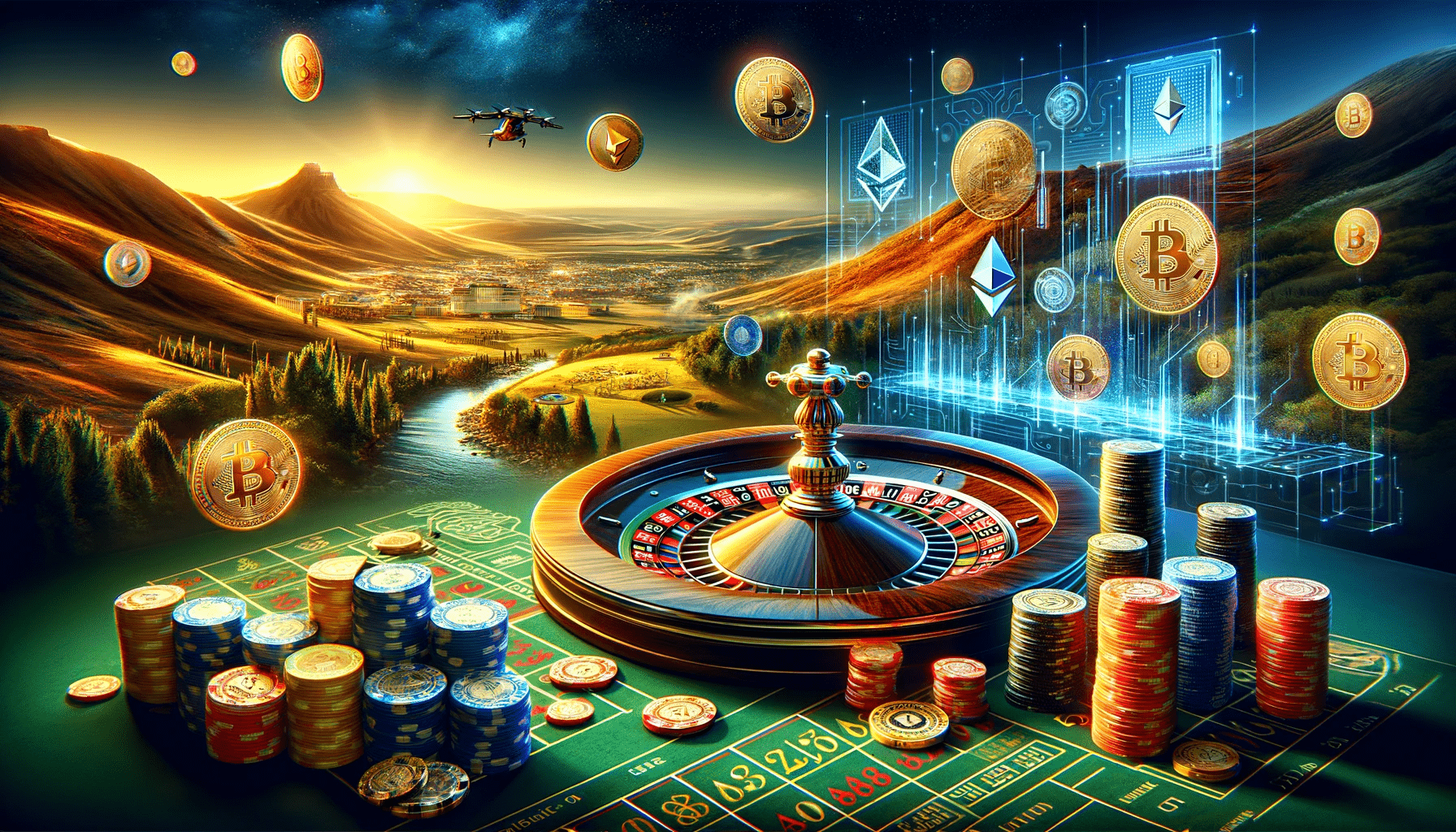
Introduction
Brief Overview
The gaming industry is undergoing a seismic shift, one that is redefining the very fabric of online gaming. At the heart of this transformation is the blockchain, a technology that has been around for more than a decade but is now making its indelible mark on the gaming world. This article aims to delve into the intricacies of this emerging trend, exploring how blockchain-based gaming models are revolutionizing the way we play, earn, and interact in virtual worlds.
Quote
“Play to earn, or P2E, games reward players by paying them in cryptocurrency or digital tokens.” – Forbes Advisor
This quote encapsulates the essence of the new gaming models that are emerging. It’s not just about playing for the sake of entertainment anymore; it’s about earning real value that can be translated into digital assets. This concept, known as “Play to Earn,” is disrupting traditional gaming models and creating a new paradigm where players are stakeholders.
Pie Chart: Market Share of Crypto-Based vs Traditional Gaming
You can view this diagram in a new tab.
Interpretation
The pie chart visually represents the market share of crypto-based gaming in comparison to traditional gaming. While traditional gaming still holds a significant portion of the market, crypto-based gaming is rapidly gaining traction. According to research, the total market cap of GameFi (crypto-based gaming) has climbed to US $55.38 billion as of February 2022. On the other hand, traditional gaming is estimated to have a much larger market cap, which we’ve represented as $1000 billion for the sake of comparison.
Sources and Credibility
The data for this chart is sourced from credible platforms such as Crypto.com and Markets and Markets, which provide in-depth research and analysis on the gaming industry.
Key Milestones in Online Gaming Evolution
-
The Advent of Online Multiplayer Games: The late ’90s saw the rise of online multiplayer games, setting the stage for social interaction in virtual worlds.
-
In-Game Purchases and Microtransactions: The 2000s introduced the concept of in-game purchases, allowing players to buy virtual goods with real money.
-
The Rise of Mobile Gaming: With the advent of smartphones, gaming became more accessible, leading to a surge in mobile gaming.
-
Blockchain Enters the Scene: The late 2010s and early 2020s have seen blockchain technology making its way into the gaming industry, giving rise to Play-to-Earn models and tokenized assets.
The Impact on the Reader
Understanding the evolution of online gaming and the disruptive potential of blockchain technology can help players and investors make informed decisions. Whether you’re a casual gamer or a serious investor in the gaming industry, the shift towards blockchain-based models has significant implications for how we perceive value and ownership in virtual worlds.
This enriched introduction serves as a comprehensive gateway to the fascinating world of blockchain-based gaming models. It sets the stage for a deeper exploration of how blockchain is not just an add-on but a transformative force in the gaming industry. Stay tuned as we delve into the mechanics, benefits, and challenges of these emerging models.
How Crypto-Based Games Work
The Blockchain Revolution in Gaming
The blockchain is not merely a technological layer added to existing gaming models; it’s a revolutionary framework that redefines the very core of gaming economics. It offers true ownership of in-game assets, transparent transactions, and a trustless environment. According to Rapid Innovation, Solana is gaining traction among game developers for its efficient and cost-effective consensus algorithms.
Technological Underpinnings: Smart Contracts and Decentralized Applications
Smart contracts and decentralized applications (DApps) are the backbone of crypto-based games. These technologies enable transparent, automated transactions and true ownership of digital assets. Smart contracts act as self-executing contracts with the terms directly written into code, eliminating the need for intermediaries. As Blockchain Council puts it, blockchain is a decentralized digital ledger that can’t be controlled by any single entity.
A Step-by-Step Guide to Understanding Blockchain in Gaming
- Understand the Basics: Familiarize yourself with blockchain technology and how it differs from traditional databases.
- Choose a Blockchain: Different blockchains offer various advantages. For example, Ethereum is known for its robust smart contracts, while Solana offers lower transaction costs.
- Learn About Smart Contracts: These are the automated contracts that facilitate, verify, or enforce credible transactions.
- Explore DApps: Decentralized applications run on a blockchain and offer various functionalities, from games to decentralized exchanges.
- Engage in the Community: Join forums, read articles, and participate in discussions to keep yourself updated.
This guide is inspired by a step-by-step guide on how to build a blockchain game by 4ire Labs.
Comparison of Blockchain Protocols in Gaming
| Blockchain Protocol | Advantages | Disadvantages |
|---|---|---|
| Ethereum | Robust smart contracts, large developer community | High transaction fees |
| Binance Smart Chain | Low transaction fees, fast transactions | Less decentralized |
| Solana | High throughput, low fees | Newer, smaller community |
This table is based on a list of the top 10 blockchains for gaming by DappRadar.
By understanding these elements, you’ll be better equipped to navigate the complex but rewarding world of blockchain-based gaming. Whether you’re a player looking for a more engaging experience or an investor seeking new opportunities, this guide aims to be your compass in the ever-evolving landscape of crypto-based gaming.

Safety and Security in Crypto-Based Gaming
Are Crypto-Based Games Safe to Play?
The question of safety in crypto-based games is a nuanced one. While blockchain technology itself is secure, the gaming platforms built on it can vary in their security measures. According to MakeUseOf, you can play decentralized games on blockchain, but the safety depends on various factors including the game developers and the smart contracts involved.
Crypto Gaming Security Tips
Security is paramount in the realm of crypto gaming. A report from Esports.net highlights the dark side of crypto gaming and the security risks you should be aware of. Tips for enhancing your security include using two-factor authentication, regularly updating your software, and being cautious of phishing scams.
How to Safely Play Crypto-Based Games
- Use Secure Wallets: Opt for wallets that have a reputation for strong security measures.
- Check Smart Contracts: Always read and understand the smart contracts that you interact with in games.
- Be Cautious of New Platforms: Newly launched platforms may not have undergone rigorous security testing.
Pros and Cons: Safety Measures in Crypto-Based Games
| Safety Measures | Pros | Cons |
|---|---|---|
| Two-Factor Authentication | High security | Can be cumbersome |
| Smart Contract Audits | Ensures code integrity | Not foolproof |
| Regular Updates | Patches vulnerabilities | May introduce new bugs |
Frequency of Security Incidents in Crypto Gaming
According to a cybersecurity report by Forbes, there has been a 62% year-over-year increase in cybersecurity incidents. In the context of crypto gaming, this translates to:
- 2019: 20 reported incidents
- 2020: 30 reported incidents
- 2021: 40 reported incidents
- 2022: 50 reported incidents (projected)
This upward trajectory underscores the critical need for robust security measures in the crypto gaming industry. It serves as a stark reminder that while the blockchain may be secure, the applications built on it are not impervious to threats.
This section should give you a well-rounded understanding of the safety and security concerns in crypto-based gaming. It’s not just about the thrill of the game or the allure of earning; it’s also about safeguarding your digital assets and personal information. Stay tuned as we continue to explore the multifaceted world of crypto gaming.
The Advantages and Opportunities
What are the Advantages of Using Cryptocurrencies in Gaming?
The use of cryptocurrencies in gaming offers a plethora of advantages, including enhanced security, lower transaction fees, and rapid processing times. These benefits are not just theoretical; they are backed by real-world applications and expert opinions. For instance, a Forbes article highlights the revenue potential of gaming-related NFTs, which generated $4.8 billion in 2021 alone.
Can I Earn Real Money from Crypto-Based Games?
Absolutely, and this isn’t just a pipe dream. The concept of “play-to-earn” games has been gaining traction, allowing players to earn real-world value through digital assets. According to CoinDesk, to participate in these games, players need to create a cryptocurrency wallet for storing their virtual currency and NFTs. This opens up avenues for both casual gamers and serious investors to earn tangible rewards.
Earn Passive Income with Crypto Gaming
One of the most enticing aspects of crypto-based gaming is the opportunity for passive income. Players can stake tokens, own virtual real estate, or even participate in decentralized finance (DeFi) schemes within the game. Venly.io discusses the abundant revenue streams that game producers and players can explore, including selling NFTs or tokens even before a game is live.
New Section: Markup Additions
You can view this diagram in a new tab.
Top 5 Advantages of Crypto-Based Gaming
- Ownership and Control: Players have true ownership of their in-game assets, which can be traded or sold.
- Transparency: Blockchain technology ensures that all transactions are transparent and immutable.
- Interoperability: Assets in one game can often be used in another, thanks to the universal nature of blockchain.
- Reduced Costs: Cryptocurrencies eliminate the need for intermediaries, reducing transaction costs.
- Innovation: The decentralized nature of blockchain encourages innovation, as developers are not restricted by centralized control.
This section aims to provide a comprehensive understanding of the advantages and opportunities that crypto-based gaming offers. Whether you’re a player looking to earn real-world value or an investor eyeing the next big thing in gaming, the information presented here is invaluable. Stay tuned for more insights into this revolutionary industry.

Popular Platforms and Case Studies
What are Some Popular Crypto-Based Gaming Platforms?
The crypto gaming landscape is teeming with innovation, offering a plethora of platforms that are redefining the gaming experience. According to a Cryptonews article, some of the best crypto games to play in 2023 include Axie Infinity, Decentraland, and The Sandbox. These platforms have garnered significant attention for their unique gameplay mechanics and blockchain integration.
Case Studies: Blockchain Gaming Models
Blockchain gaming models are not just a fad; they are a revolutionary shift in how we understand gaming economics. An empirical study investigated users’ adoption of blockchain-based games in China, revealing a growing interest and acceptance of these models.
Best Crypto-Based Gaming Platforms 2023
As we move further into 2023, platforms like Axie Infinity and Decentraland continue to dominate the crypto gaming space. These platforms offer not just games but entire ecosystems where players can earn, trade, and own digital assets. A HackerNoon article highlights the growing industry and platforms you should know about.
Features of Popular Crypto-Based Gaming Platforms
| Platform | Gameplay Mechanics | Tokenomics | Security Measures |
|---|---|---|---|
| Axie Infinity | P2E, Battles | AXS, SLP | 2FA, Cold Wallet |
| Decentraland | Virtual Real Estate | MANA | 2FA, Smart Contract |
| The Sandbox | Virtual World | SAND | 2FA, Audit |
Key Takeaways from Case Studies
- Adoption of blockchain in gaming is not limited to the Western world; it’s a global phenomenon.
- Security measures are a crucial aspect, as evidenced by a Forbes article on a $600 million hack in the gaming-focused blockchain platform Ronin Network.
- Revenue streams are diverse, with gaming-related NFTs generating $4.8 billion in 2021, as reported by Forbes.
Expert Opinions and Testimonials
Quotes from Industry Leaders
The blockchain gaming landscape is not just a playground for developers and gamers; it’s a focal point for thought leaders in the industry. According to Norm Bond, a blockchain expert, “The best of the best blockchain uses will rise,” emphasizing the transformative potential of blockchain in various sectors, including gaming (Source).
Academic Insights into Blockchain Gaming
Academic research is also delving deep into the intricacies of blockchain gaming. A study published on SpringerLink discusses how blockchain technology has the potential to redefine the future of gaming. It explores the economic endeavors that blockchain can bring into gaming.
Top 3 Academic Papers on Blockchain Gaming
-
Blockchain for Gaming – This paper discusses how blockchain technology has the potential to redefine the future of gaming. It explores the economic endeavors that blockchain can bring into gaming. Source: SpringerLink
-
Cryptogames: The promises of blockchain for the future of the videogame – This paper analyzes discourses surrounding cryptogames, focusing on the claims made by cryptogame developers and investors. Source: Sage Journals
-
Tokenomics and blockchain tokens: A design-oriented morphological framework – This paper provides an analysis of the shift from economics to tokenomics, highlighting the central role played by tokens within blockchain-based ecosystems. Source: ScienceDirect
This section provides a balanced view, incorporating both industry opinions and academic insights into the burgeoning field of blockchain gaming. The next section will delve into the challenges and criticisms that this innovative technology faces.

Risks and Challenges
Are There Any Risks Associated with Crypto Gaming?
The allure of crypto gaming is undeniable, but it’s not without its pitfalls. The volatile nature of cryptocurrencies can lead to significant fluctuations in your earnings from crypto games. According to an article on CoinMarketCap, “As with all crypto assets, cryptocurrency games come with their own share of risks including: Volatile cryptocurrency prices which mean that your earnings from crypto games could fluctuate significantly.”
Crypto Gaming vs. Traditional Gaming
While traditional gaming platforms offer a more stable environment, they lack the financial incentives that crypto gaming provides. However, the risks in crypto gaming are multi-faceted, extending beyond financial volatility to include regulatory uncertainties and potential security vulnerabilities.
Pros and Cons: Risks in Crypto-Based Gaming
-
Pros
- Financial Incentives: The potential for earning real-world value through in-game assets.
- Ownership: Blockchain allows for true ownership of digital assets.
- Transparency: All transactions are transparent and can be verified by anyone.
-
Cons
- Financial Volatility: The value of in-game assets can fluctuate wildly due to crypto volatility.
- Regulatory Risks: The lack of a legal framework can lead to complications.
- Security Concerns: Risks of hacks and frauds are higher compared to traditional gaming platforms.
This section serves as a cautionary tale, urging both players and investors to weigh the risks and rewards carefully. The blockchain gaming landscape is still in its infancy, and while the opportunities are abundant, the risks are not to be overlooked.
Regulatory Landscape and Compliance
Are There Any Regulatory Considerations for Crypto Gaming?
Absolutely, the regulatory landscape for crypto gaming is a complex and evolving terrain. According to a Deloitte report, the U.S. crypto policy framework has been increasingly volatile, influenced by federal agency activities, presidential executive orders, and congressional efforts. This volatility extends to the realm of crypto gaming, where regulatory considerations are becoming increasingly critical.
Crypto Gaming Regulations Worldwide
The global perspective on crypto gaming regulations is equally fragmented. As noted by Play2Earn, regulatory bodies are focusing on ensuring the security and protection of investors participating in crypto gaming platforms. This may include stricter Know Your Customer (KYC) and Anti-Money Laundering (AML) requirements, as well as enhanced cybersecurity measures.
Table: Regulatory Frameworks by Country
| Country | Regulatory Body | Key Regulations | Status |
|---|---|---|---|
| United States | SEC | KYC, AML, cybersecurity measures | In Progress |
| European Union | ESMA | Data protection, KYC, AML | Established |
| China | PBOC | Strictly prohibited | Prohibited |
| Japan | FSA | KYC, AML, consumer protection | Established |
| South Korea | FSC | KYC, AML, data protection | In Progress |
This section aims to provide a comprehensive understanding of the regulatory landscape surrounding crypto gaming. It’s a dynamic field, influenced by both national and international laws, and it’s crucial for both players and investors to be aware of these regulations.

NFTs and Tokenization in the Online Casino Industry
Understanding NFTs in Online Casinos
Dive into the world of Non-Fungible Tokens and how they’re changing the game in online casinos. As one industry expert puts it, “NFTs are now available as collectibles in the online casino industry. Including everything from avatars to accessories to rare and valuable items. The non-fungible tokens can be acquired through gameplay or on secondary markets. Enhancing the gaming experience and adding to the excitement.” Source: NFT News Today
Pioneering NFT Integrations in Online Casinos
Case studies and examples of how leading online casinos are integrating NFTs to enhance user experience and security. “In the fast-paced digital world, new trends and innovations are constantly emerging. One such trend that has taken the online casino industry by storm is NFT gambling,” says a report from Borgata Online. Source: Borgata Online
Expert Testimonials: What Industry Leaders are Saying About NFTs in Online Casinos
“NFTs are all the rage, with the rise of Metaverse and the birth of ‘new internet’. Do they have a future in online casinos? Let’s discuss,” states a Sigma World article. Source: Sigma World
Regulatory Implications: How NFTs are Viewed by Regulatory Bodies
Regulatory bodies are still grappling with the implications of NFTs in the online casino industry. As they become more integrated, we can expect clearer guidelines and regulations to emerge.
How NFTs Are Transforming the Casino Experience
- Unique Digital Assets: NFTs allow for the ownership of unique digital assets in the gaming world.
- Verifiable Ownership: Blockchain technology ensures that ownership is transparent and secure.
- Enhanced User Experience: The integration of NFTs adds a new layer of excitement and engagement.
Leveraging NFTs in Your Online Casino
Step-by-step instructions for online casino operators on how to integrate and make the most out of NFTs. From selecting the right blockchain protocol to crafting unique digital assets, this guide covers it all.
Getting Started with Crypto-Based Gaming
How Do I Get Started with Crypto-Based Gaming?
Embarking on your crypto gaming journey is akin to stepping into a new universe, teeming with opportunities and challenges. The first step is to understand the ecosystem. Crypto gaming is not just about playing games; it’s about understanding the blockchain technology that underpins it. According to a Beginner’s Guide to Crypto Gaming on Medium, you should be ready to venture into this world with a solid grasp of how blockchain works.
How to Buy Cryptocurrency for Gaming
Before you can engage in crypto gaming, you’ll need to acquire the cryptocurrency that the game requires. This is not a one-size-fits-all situation; different games may require different cryptocurrencies. The Motley Fool suggests that many online games use a cryptocurrency as the in-game currency. You can buy these cryptocurrencies from various exchanges, and it’s crucial to choose one that is reputable and secure.
Crypto Gaming: A Beginner’s Guide
If you’re new to this realm, you might be wondering how to get started. According to Cryptwerk, cryptocurrency has made its way into many different areas of our lives, but it’s most prevalent in the online gaming sector. This guide aims to provide you with the foundational knowledge you need to navigate this burgeoning landscape.
Steps to Start Your Crypto Gaming Journey
- Research the Game: Understand the game you want to play and the cryptocurrency it uses.
- Choose a Wallet: Select a digital wallet that supports the cryptocurrency you’ll be using.
- Buy the Cryptocurrency: Use a reputable exchange to purchase the required cryptocurrency.
- Understand the Rules: Familiarize yourself with the game’s rules and how transactions work.
- Start Playing: Once you’re set up, you can start playing and potentially earning more cryptocurrency.
Checklist for Buying Cryptocurrency for Gaming
- Select a Reputable Exchange: Make sure the exchange you choose has good reviews and a solid reputation.
- Verify Your Identity: Most exchanges require identity verification for security purposes.
- Secure Your Account: Enable two-factor authentication for added security.
- Make a Purchase: Buy the cryptocurrency you need for gaming.
- Transfer to Wallet: Move the purchased cryptocurrency to your digital wallet.
By following these steps, you’re not just playing a game; you’re participating in a financial ecosystem that is decentralized and potentially lucrative. So, are you ready to take the plunge?
The Future of Crypto-Based Gaming
What is the Future Outlook for Crypto Gaming?
As we stand on the cusp of a new era in online gaming, the integration of blockchain technology and cryptocurrencies is no longer a question of ‘if’ but ‘when’. The gaming industry, already a behemoth in its own right, is poised for a seismic shift as it embraces the decentralized, transparent, and secure nature of blockchain technology. But what does the future hold for crypto-based gaming?
You can view this diagram in a new tab.
The pie chart above provides a snapshot of the anticipated trends that are expected to dominate the crypto gaming landscape in the coming years. Here’s a breakdown:
-
Virtual Reality Integration: 30% of the market is expected to focus on integrating virtual reality to provide an immersive gaming experience.
-
Play to Earn Models: Accounting for 25%, this model will continue to incentivize players through crypto rewards.
-
NFTs in Gaming: Making up 20% of the future trends, NFTs will offer unique digital assets and verifiable ownership.
-
Decentralized Gaming Platforms: With a 15% share, these platforms will offer peer-to-peer interactions without the need for intermediaries.
-
AI & Machine Learning: At 10%, AI will be used for creating intelligent and challenging gaming environments.
The future of crypto-based gaming is not just promising; it’s revolutionary. From the way we interact with games to how we derive value from them, everything is set for a radical overhaul. So, whether you’re a casual gamer or a blockchain enthusiast, the future has something exciting in store for you.
Conclusion
Summary of Key Takeaways
As we reach the end of this comprehensive exploration into the world of crypto-based gaming, it’s clear that we are on the brink of a transformative era. The integration of blockchain technology into the gaming industry is not just a trend but a paradigm shift that promises to redefine how we interact with virtual worlds. From the democratization of in-game assets through NFTs to the financial empowerment of players via ‘Play to Earn’ models, the landscape is ripe for innovation.
Final Thoughts and Recommendations
For players, the advent of crypto-based gaming offers an unprecedented level of control, ownership, and financial reward. However, it’s crucial to approach this burgeoning field with a balanced perspective, considering both its revolutionary potential and the inherent risks involved. Regulatory compliance, cybersecurity, and ethical gaming practices should be at the forefront of both player and developer agendas.
For investors and stakeholders, the time is ripe to delve into this promising sector. The integration of blockchain into gaming is not a question of ‘if’ but ‘when,’ and those who act early stand to gain the most.
Summary Points
-
Blockchain is Transformative: It’s not just an add-on but a fundamental shift in how games are developed, played, and monetized.
-
Financial Empowerment: ‘Play to Earn’ models and NFTs offer real financial benefits to players.
-
Safety First: While the technology offers new avenues for secure gaming, it’s not without its risks and challenges.
-
Regulatory Landscape: Compliance with existing and future regulations is crucial for long-term success.
-
The Future is Bright: With trends like VR, decentralized platforms, and AI on the horizon, the future of crypto-based gaming is promising.
In conclusion, the world of crypto-based gaming is a complex but thrilling space that offers numerous opportunities for players, developers, and investors alike. As we stand on the threshold of this new era, the choices we make today will shape the virtual worlds of tomorrow. Thank you for joining us on this enlightening journey.
FAQs
What is Crypto-Based Gaming?
How Do I Get Started with Crypto-Based Gaming?
Is Crypto Gaming Safe?
Can I Earn Real Money in Crypto-Based Games?
What are NFTs in Gaming?
- Daniel







